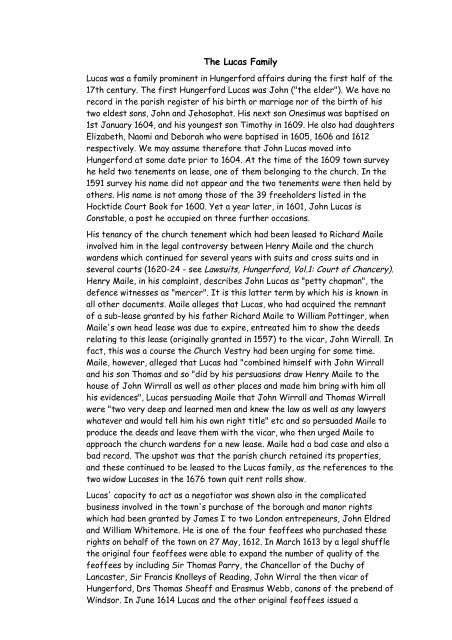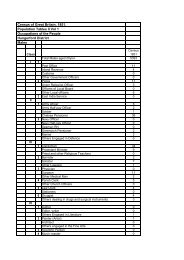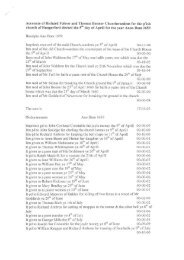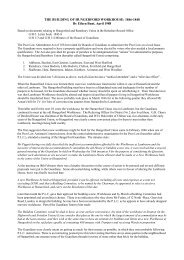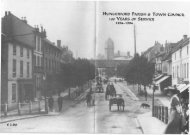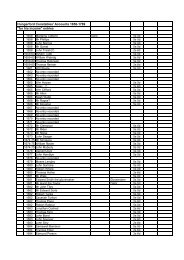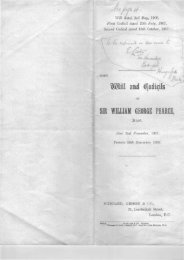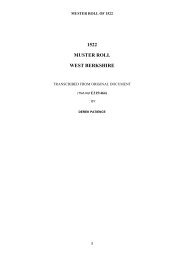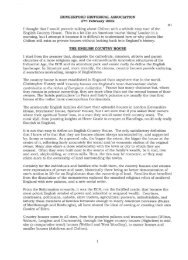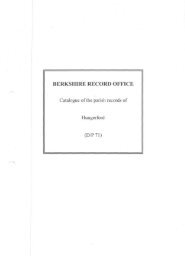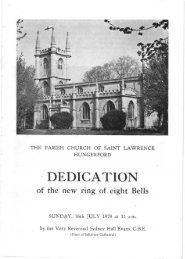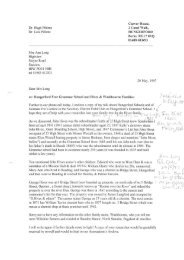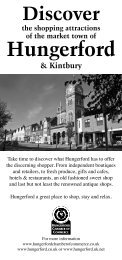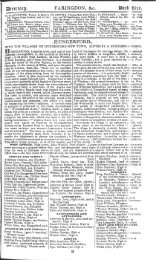The Lucas Family - Hungerford Virtual Museum
The Lucas Family - Hungerford Virtual Museum
The Lucas Family - Hungerford Virtual Museum
You also want an ePaper? Increase the reach of your titles
YUMPU automatically turns print PDFs into web optimized ePapers that Google loves.
<strong>The</strong> <strong>Lucas</strong> <strong>Family</strong><br />
<strong>Lucas</strong> was a family prominent in <strong>Hungerford</strong> affairs during the first half of the<br />
17th century. <strong>The</strong> first <strong>Hungerford</strong> <strong>Lucas</strong> was John ("the elder"). We have no<br />
record in the parish register of his birth or marriage nor of the birth of his<br />
two eldest sons, John and Jehosophat. His next son Onesimus was baptised on<br />
1st January 1604, and his youngest son Timothy in 1609. He also had daughters<br />
Elizabeth, Naomi and Deborah who were baptised in 1605, 1606 and 1612<br />
respectively. We may assume therefore that John <strong>Lucas</strong> moved into<br />
<strong>Hungerford</strong> at some date prior to 1604. At the time of the 1609 town survey<br />
he held two tenements on lease, one of them belonging to the church. In the<br />
1591 survey his name did not appear and the two tenements were then held by<br />
others. His name is not among those of the 39 freeholders listed in the<br />
Hocktide Court Book for 1600. Yet a year later, in 1601, John <strong>Lucas</strong> is<br />
Constable, a post he occupied on three further occasions.<br />
His tenancy of the church tenement which had been leased to Richard Maile<br />
involved him in the legal controversy between Henry Maile and the church<br />
wardens which continued for several years with suits and cross suits and in<br />
several courts (1620-24 - see Lawsuits, <strong>Hungerford</strong>, Vol.1: Court of Chancery).<br />
Henry Maile, in his complaint, describes John <strong>Lucas</strong> as "petty chapman", the<br />
defence witnesses as "mercer". It is this latter term by which his is known in<br />
all other documents. Maile alleges that <strong>Lucas</strong>, who had acquired the remnant<br />
of a sub-lease granted by his father Richard Maile to William Pottinger, when<br />
Maile's own head lease was due to expire, entreated him to show the deeds<br />
relating to this lease (originally granted in 1557) to the vicar, John Wirrall. In<br />
fact, this was a course the Church Vestry had been urging for some time.<br />
Maile, however, alleged that <strong>Lucas</strong> had "combined himself with John Wirrall<br />
and his son Thomas and so "did by his persuasions draw Henry Maile to the<br />
house of John Wirrall as well as other places and made him bring with him all<br />
his evidences", <strong>Lucas</strong> persuading Maile that John Wirrall and Thomas Wirrall<br />
were "two very deep and learned men and knew the law as well as any lawyers<br />
whatever and would tell him his own right title" etc and so persuaded Maile to<br />
produce the deeds and leave them with the vicar, who then urged Maile to<br />
approach the church wardens for a new lease. Maile had a bad case and also a<br />
bad record. <strong>The</strong> upshot was that the parish church retained its properties,<br />
and these continued to be leased to the <strong>Lucas</strong> family, as the references to the<br />
two widow <strong>Lucas</strong>es in the 1676 town quit rent rolls show.<br />
<strong>Lucas</strong>' capacity to act as a negotiator was shown also in the complicated<br />
business involved in the town's purchase of the borough and manor rights<br />
which had been granted by James I to two London entrepeneurs, John Eldred<br />
and William Whitemore. He is one of the four feoffees who purchased these<br />
rights on behalf of the town on 27 May, 1612. In March 1613 by a legal shuffle<br />
the original four feoffees were able to expand the number of quality of the<br />
feoffees by including Sir Thomas Parry, the Chancellor of the Duchy of<br />
Lancaster, Sir Francis Knolleys of Reading, John Wirral the then vicar of<br />
<strong>Hungerford</strong>, Drs Thomas Sheaff and Erasmus Webb, canons of the prebend of<br />
Windsor. In June 1614 <strong>Lucas</strong> and the other original feoffees issued a
declaration that it was agreed by them and the rest of the inhabitants that<br />
the conveyance made on 27 May 1612 was to be for the benefit of all the<br />
inhabitants of <strong>Hungerford</strong>. Implicitly there must have been some public<br />
anxiety concerning the concentration of power which had come into the hands<br />
of the four local tradesmen. <strong>The</strong>y therefore pointed out that it was in<br />
pursuance of this trust that the subsequent conveyances of 1613, to a wider<br />
and more distinguished body, had been made. Criticism, however, must have<br />
attached itself to this new body, although perhaps from a slightly different<br />
angle, for the feoffees went on to acknowledge that they were feoffees only in<br />
trust for the inhabitants of the town (exluding the tenants of the Dean and<br />
Canons of Windsor), and to that intent they would account for their<br />
management of the town before the Constable and burgesses on the occasion<br />
of the next Court Leet. <strong>The</strong>y declared further that when their present<br />
numbers fell below 4 or 5, they would allow the inhabitants to appoint 12 or 13<br />
men to choose additional feoffees to bring the total to 9 or more. <strong>The</strong><br />
signatories promised to satisfy the actions of this body until such time as a<br />
corporation should be established and the inhabitants thereby enjoy its<br />
privileges in their own right.<br />
Clearly the protracted legal complications in setting up a satisfactory trust<br />
were disturbing to some townsmen to whom such legal complications or delays<br />
were unfamiliar. In 1617, however, a transfer sale took place which<br />
transferred the manor and borough to a full representative body of<br />
burgesses. John <strong>Lucas</strong> was not among them, but this was not for any lack of<br />
confidence in him, for in that year they elected him as Constable, the first of<br />
the new corporation and then re-elected him in 1618 and 1620.<br />
<strong>Lucas</strong> had had a difficult set of negotiations to handle; and whoever had<br />
handled them would surely have had a rough ride. In his "Story of<br />
<strong>Hungerford</strong>" W.H. Summers fails to make use of documents other than those<br />
immediatley accessible to him among the Borough MSS then in the Town Hall.<br />
By such limitation he omits the lawsuit launched against <strong>Lucas</strong> and his cofeoffee<br />
Ralph Mackerell by such luminaries as the Earl of Rutland, Henry<br />
Sadler esq, Edward <strong>Hungerford</strong> esq, together with townmen Ralp Harrold,<br />
John Bradford and John Burch who claimed to be acting in the interests of "all<br />
other the inhabitants, copyholders and freeholders" of the borough.<br />
This suit (PRO C2/JasI/Rl/7) was presented in May 1613. <strong>The</strong> plaintiffs' bill<br />
describes how, following the purchase of Eldred and Whitmore, the<br />
freeholders and inhabitants of the borough had "divers meetings and<br />
conferences concerning the purchasing of the said borough", and a sum of<br />
money was agreed, and the four feoffees were chosen by the inhabitants to<br />
"undertake the purchasing and contracting for the said borough". <strong>The</strong> real<br />
problem which confronted the inhabitants was how to raise the purchase price<br />
of £285. Various courses were proposed but at length it was considered that<br />
the money could be raised by demising "for some small time" the borough<br />
commons or waste land, in which some of the suppliants had an interest of the<br />
soil and freehold and others had rights of common.<br />
What disturbed these townsmen was that the sale to Elgar and Field seemed
to have been made so that the interest in the property was sold to them not as<br />
trustees but so they became possessed of the estate in fee simple. Similarly,<br />
when Elgar and Field transferred to the extended body this was again without<br />
any mention of trust. In the light of these charges it is easy to see why the<br />
feoffees issued their declaration in June 1614. <strong>The</strong> plaintiffs continued their<br />
case by alleging that John <strong>Lucas</strong> was the principal "director" of the<br />
transaction and that he was "a man of not good note" - unlike, say, the Earl of<br />
Rutland, Henry Sadler esq, and Edward <strong>Hungerford</strong> esq, gentlemen whose<br />
social status clearly made them of "note". How far these non-resident<br />
gentlemen were concerned with the active prosecution of the suit is unclear; it<br />
is likely that they were brought in primarily because of their particular<br />
interest as freeholders and that the real thrust of the suit came from the<br />
"residents" Harrold, Bradford and Burch. <strong>The</strong> argument is brought forward<br />
that the feoffees - or the survivors of them - may make claim "as they already<br />
begin to do (if they survive the suppliants) to the absolute inheritance of the<br />
just right and lawful title". <strong>The</strong> suppliants, or plaintiffs, therefore request<br />
that the trust may be set down in writing and that a new set of responsible<br />
trustees be appointed.<br />
In answer <strong>Lucas</strong> and Mackerell state that they were the chief representatives<br />
of the townsmen and that <strong>Lucas</strong> went to London to deal with Eldred and<br />
Whitmore for the purchase of the patent which the Crown had granted them<br />
for the sum of £285. This sum they raised by various loans at interest for<br />
three months. Such a short term loan suggested that they may have been<br />
anxious to clinch the deal before some other purchaser or prospective<br />
purchaser might deprive them of it. At any rate they could not repay this<br />
short term loan within the 3 months, and so a further loan of £300 was raised<br />
in London, repayable within 4 months. This seems to have been cleared by<br />
"leasing the downs or waste for £240 for a certain term yet to run" and by<br />
felling trees and woods to realise a further £60. Finally, all the deeds were<br />
properly delivered and executed in the town hall and in the presence of the<br />
inhabitants.<br />
This was the law suit to which the Charity Commissioners in 1906 referred<br />
when that stated that "legal proceedings followed, which have unfortunately<br />
not been traced". <strong>The</strong> details of this suit reveal the difficulties - and the<br />
opposition - which confronted those townsmen who were willing to take an<br />
active part in bringing about a new constitution for the borough; and of these<br />
activists John <strong>Lucas</strong> must be regarded as the chief. <strong>The</strong> preliminaries of the<br />
town's new status took five or six years and its final achievement then led to<br />
the election of <strong>Lucas</strong> as Constable to steer the new constitution for three of<br />
its first four years. Thus altogether almost a decade of his life was spent<br />
more or less full time on this affair. It is appropriate, though quite<br />
coincidental, for the builders of the present town hall in 1870 did not know<br />
this, that the present town hall should stand on the very site of one of the<br />
two adjacent houses which John <strong>Lucas</strong> tenanted during all those years.<br />
It is also notable that, although Constable on four occasions, he never held<br />
freehold property and so does not appear in the lists of freeholders from
1600 onwards. He is one of a number of instances where a Constable has been<br />
elected from non-freeholders. Moreover, if he came to <strong>Hungerford</strong> from<br />
without the parish (as the lack of parish register entries regarding his birth,<br />
marriage and the baptism of his two eldest sons suggests) then it is difficult<br />
to see how he could have been Constable in 1601 and have passed successively<br />
through the qualifying offices of port reeve, bailiff and tithing man,<br />
precedent to his Constableship.<br />
He was a mercer by trade and, as his will shows, a man of some financial<br />
substance. He left cash bequests to his children totalling £700 - each of his<br />
three daughters received an equal amount as each of his four sons, with the<br />
exceptions of his second son Jehosophat and his third son Onesimus.<br />
Jehosophat however, not the eldest son John, was appointed executor of and<br />
received the remainder of his estate (after some further small bequests) and<br />
the care of the deceased's wife, Elizabeth who is "to have her maintenance<br />
with my executor in the best manner he can, as I have done". Onesimus<br />
received £200, double the amount of each of the others. Although the eldest<br />
son John received £100, the relative coolness shown to him is obvious,<br />
especially when it is considered that another son is the one entrusted both<br />
with the executorship and with the care of his mother. A late addition to the<br />
will is in the form of an admonition to his executor, which seems to say "Also<br />
let not Thomas Mundy enjoye that goods that he hath unjustly or if by law you<br />
may get it but let my son John have the most part of it because he is<br />
accustomed to it (when you have it)".<br />
Among minor bequests in his will were the customary sums to be distributed to<br />
the poor and to the parish church, there was a bequest of £10 "towards the<br />
setting up of a school in <strong>Hungerford</strong> or Sandon - provided it be built or set up<br />
within the ten years". <strong>The</strong> provision of a local free school was very much in<br />
the minds of forward looking townsmen about this time and the establishment<br />
of such a school is usually attributed to the bequest in Dr Sheaff s will of a<br />
piece of land in Church Field. Sheaff, it will be remembered, was a colleague<br />
of <strong>Lucas</strong> on the board of feoffees set up in 1614. W.H. Summers describes<br />
the old Grammar School (p.160) as "Sheaff s Charity". He seems not to have<br />
known of John <strong>Lucas</strong>' will and earlier bequest. <strong>The</strong> legacy shows <strong>Lucas</strong>'<br />
continued concern for the town and its townsmen: it also shows in its<br />
conditional clause an awareness of their natural tendency to dally unless<br />
pushed - or led. Fortunately, the further bequest of Dr Sheaff probably<br />
ensured that the £10 left by <strong>Lucas</strong> was able to be utilised within the<br />
conditional term.<br />
II<br />
From 1604 onwards all of John <strong>Lucas</strong>' five children born after that date were<br />
baptised in the parish church. His wife Elizabeth was a frequent witness or<br />
godparent at others' christenings. In his will he left a small sum to the<br />
church. It is clear therefore that he accepted the Anglican Church. <strong>The</strong>re<br />
are however in his life and work traces of a work ethic and a social welfare<br />
ethic which may suggest that he was in time with the developing Puritan<br />
thought and feeling shown at this time by so many of the prosperous middle or
merchant class. A further indication is the naming of his children - each one<br />
of them was given a Christian name based on Biblical characters. John and<br />
Elizabeth are perhaps not outstanding as such, and Deborah may be more<br />
common or familiar today than it was then; so too perhaps Naomi; Timothy<br />
might also be unremarkable had it not been given as Tymotheus. But there is<br />
no questioning the Biblical and therefore probably Puritan tone of Jehosophat<br />
and Onesimus.<br />
Of John's male children two, Jehosophat and Timothy, became local worthies<br />
and were each Constable of the town. Onesimus and John were not cast to be<br />
businessmen like their two brothers.<br />
We know little of Onesimus other than what is told us in his will. His father's<br />
legacy, double that of the cash bequests to any of his brothers and sisters,<br />
shows a concern for him which may derive from special affection, a realisation<br />
of his relative incapacity to make his living by trade, or a knowledge of illhealth<br />
which would cut short his years; or, of course, a combination of these<br />
concerns. In fact, Onesimus died young, aged only 34. He was married but had<br />
no children. His wife's name was a good Puritan name, Rebecca. And his will is<br />
full of extreme Puritan sentiments.<br />
It was drafted 20 September 1638 and he was dead before the year was out.<br />
It was signed by him, but there were no witnesses; and the composition would<br />
seem to have been personal - the work of a person with a scholarly,<br />
introverted, and bookish bent. Indeed of personal possessions books are one<br />
of the few items which he has to leave (bonds, books, clothes). This personal<br />
preamble to his will is such a good example of a certain kind of Puritan thought<br />
and feeling which was affecting others in the country - and in the local area of<br />
<strong>Hungerford</strong> - that 1 reproduce it verbatim. He begins by stating that he is the<br />
son of John <strong>Lucas</strong> late of <strong>Hungerford</strong> deceased and, having thus identified<br />
himself, proceeds:<br />
"I commend my soul to God that gave it in the name of merit and mediation of<br />
Christ Jesus my lord and only saviour and Redeemer, adhering to, professing<br />
and confessing and ending my life in the truly ancient authentic and orthodox<br />
faith which is contained in the most sacred and revealed will of God in the<br />
writings of the old and new testaments, abhorring and detesting those<br />
superstitions (?) and patches (?) of opinions which have lately been superadded<br />
to the most holy and ancient faith by Rome and her adherents, these I do<br />
most religiously reject and do constantly forever refuse them, being repugnant<br />
to the work of God and doubtful, damnable, looking only to Christ Jesus the<br />
Author and fisher (?) of my faith, not doubting but through faith in his name<br />
and him alone according to the Scriptures John 3.15, 16, 18; Acts 4.129 and by<br />
his blood-shedding to obtain remission of all my sins and everlasting life<br />
whereof he hath given me earnest here by testimony of his holy spirit and<br />
assurance, by the fruit and effect of the same, who notwithstanding I confess<br />
myself and acknowledge myself to be a vile, detestable and abominable<br />
transgressor by reason of my original corruption and actual sins, so that I<br />
cannot speak against myself as I deserve, for which cause I abhor myself and<br />
repent in truth of heart and for which sins he may justly abhor me and cast
me off forever, my conscience bearing me record that I desire to forsake all<br />
sin and to embrace all virtue and piety God for Christ his sake doth accept the<br />
evil in me, his poor unworthy servant for the deed (?)".<br />
Onesimus requested to be buried in the parish churchyard near to his father<br />
and sisters. He left sums of money to his two nephews, John and Jehosophat,<br />
sons of his brother Jehosophat. He says they are his nearest kinsmen and the<br />
chief supporter of the family. He does not mention his brothers John and<br />
Timothy.<br />
Norman Hidden


